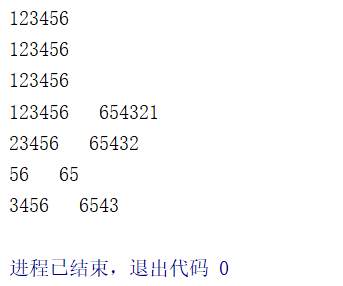描述:写一个函数,它接受一个字符串,做的事情和 strip()字符串方法一样。如果只传入了要去除的字符串, 没有其他参数, 那么就从该字符串首尾去除空白字符;否则, 函数第二个参数指定的字符将从该字符串中去除。
注意:strip()字符串方法将返回一个新的字符串, 它的开头或末尾都没有空白字符。lstrip()和 rstrip()方法将相应删除左边或右边的空白符。
代码:
1 #!/usr/bin/python 2 # -*- coding: UTF-8 -*- 3 import re 4 5 def strip(text, chars=None): 6 """去除首尾的字符 7 :type text: string 8 :type chars: string 9 :rtype: string 10 """ 11 if chars is None: 12 reg = re.compile('^ *| *$') 13 else: 14 reg = re.compile(r'^[' + chars + ']*|[' + chars + ']*$') 15 return reg.sub('', text) #把text里符合reg格式的字符串替换成'',也即去掉该字符串 16 17 print(strip(' 123456 ')) # 123456 18 print(strip(' 123456')) # 123456 19 print(strip(' 123456 ')) # 123456 20 print(strip('123456 654321')) # 123456 654321 21 print(strip('123456 654321', '1')) # 23456 65432 22 print(strip('123456 654321', '1234')) # 56 65 23 print(strip('123456 654321', '124')) # 3456 6543
运行结果:
